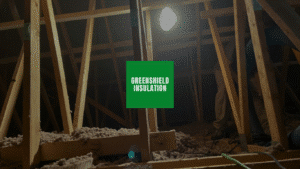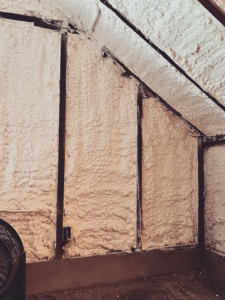Partnered with Consumers Energy for Premium Insulation Rebates
As a proud Consumers Energy Authorized Insulation Rebate Partner, Greenshield Insulation delivers high-performance, energy-efficient insulation backed by one of Michigan’s most trusted utility providers. When you work with us, you’re choosing a certified contractor who can help you access up to $1,200 in rebates and tax credits on qualifying upgrades.
From the first consultation to final inspection, our team takes care of all the paperwork — ensuring you receive every dollar you're eligible for. We specialize in spray foam, blown-in cellulose, and whole-home air sealing that meets and exceeds rebate requirements.
📞 Schedule Your Free Rebate ConsultationOr email us anytime at greenshieldco@gmail.com
Michigan Home Heat-Loss Scorecard
Where most homes in SW Michigan lose heat (and money)
Homeowners often ask: “Where does my house lose heat?” In Michigan, the biggest culprits are usually the attic, walls, rim joist, and crawl space/basement areas — plus leaky ductwork. Use this scorecard to spot the most common problem zones, then we can confirm the best fix during your free estimate.
Attic / Ceiling
Warm air rises. If your attic is under-insulated or not air sealed, heat escapes fast. This is often the #1 upgrade for comfort and savings.
Exterior Walls
Empty or underfilled wall cavities create cold rooms and uneven temperatures — especially in older homes. Sidewall cellulose can make a major difference.
Rim Joist / Band Board
Rim joists are a major air-leak zone. Even “good insulation” won’t fix drafts if air is moving through gaps. Closed cell spray foam is a common solution here.
Crawl Space / Basement
Heat loss and moisture issues often come from below. Sealing + insulating crawl space or basement walls helps reduce cold floors and humidity.
Ductwork (if applicable)
Leaky ducts in attics, basements, or crawl spaces can dump conditioned air into unconditioned areas. Sealing and insulating ducts can improve room-to-room comfort.
Fast Next Step
The biggest savings typically come from fixing the top of the home (attic) and the leakiest air zones (rim joists & penetrations). Greenshield Insulation will assess your home and recommend the best plan — with a free estimate.
Serving the Greater Mattawan Area and Beyond
At Greenshield Insulation, we proudly deliver high-quality insulation services to homeowners and businesses across Southwest Michigan. From Mattawan to Portage, Kalamazoo, and nearby areas, our experienced, family-owned team specializes in improving comfort, energy efficiency, and long-term savings. Not sure if we serve your area? Contact us today — if you’re within 40 miles of Mattawan, there’s a good chance we’ve got you covered!
Flexible Appointment Scheduling
We understand life gets busy. That’s why we offer flexible scheduling options to make sure your insulation project fits seamlessly into your day. Contact us today to find a time that works for you!
Local Insulation Contractors You Can Trust
At Greenshield Insulation, we pride ourselves on being a family-owned business dedicated to providing quality insulation solutions. With years of experience under our belt, we understand the importance of making your home comfortable and energy-efficient. We’re not just professionals; we’re your neighbors, committed to serving our community with reliable and friendly service.
Our Commitment to Top Quality Insulation Service
We aim to exceed your expectations with every project. Our team works hard to ensure that you receive personalized service tailored to your specific insulation needs. From initial consultations to the final installation, we are here to guide you every step of the way. Trust us to keep your home cozy and energy-efficient for years to come. Greenshield is SPF Certified in Spray Foam Insulation, and over 50 combined years experience as residential insulation specialists.
Insulation plays a key role in maintaining temperature stability in your home. It reduces energy costs and enhances comfort. Choosing the right insulation can make a significant difference in your everyday living.
We offer various insulation types including fiberglass, spray foam, and cellulose. Each type has unique properties suited for different needs, ensuring you get the best fit for your space. Our team can help you decide which option is right for you.
If you have questions about our insulation services, feel free to reach out. Our friendly team is here to provide the answers and support you need. Contact us via phone or email to get started.
Get in Touch
We’re here to answer your questions. Fill out the form below, and we’ll get back to you as soon as we can.
greenshieldco@gmail.com
269-743-3121
23247 W McGillen Ave. Mattawan, MI.
Why Choose Greenshield Insulation?
Trusted Local Experts
Top-Quality Materials
Outstanding Customer Service

Common Attic Insulation Mistakes in Southwest Michigan | Greenshield Insulation
Common Attic Insulation Mistakes (And How Michigan Homeowners Can Avoid Them) At Greenshield Insulation, we provide quality insulation solutions to enhance your home’s comfort. By Greenshield Insulation – Serving Kalamazoo, Portage, Mattawan, Paw Paw, Allegan County & Southwest Michigan If your home feels drafty in winter, overheats in summer, or

Spray Foam Insulation in Southwest Michigan: Expert Guide for Homeowners & Pole Barn Owners
Local Spray Foam Guide | Greenshield Insulation Save More with 2025 Insulation Tax Credits Did you know upgrading your insulation can lower your tax bill? With the federal Energy Efficient Home Improvement Credit, homeowners in Mattawan, Portage, Kalamazoo County, Allegan County, and beyond can claim 30% of insulation material costs,

Attic Insulation Upgrades: Boost Efficiency in Otsego, MI This Fall
Upgrade Your Insulation for a Cozier Home in Otsego Our Services Transform Your Home Comfort Why Insulate Your Attic You Ask? Energy Efficiency Boost your home’s energy efficiency and save on utility bills with upgraded attic insulation. Indoor Comfort Experience more consistent indoor temperatures, keeping your home cozy year-round. Attic

